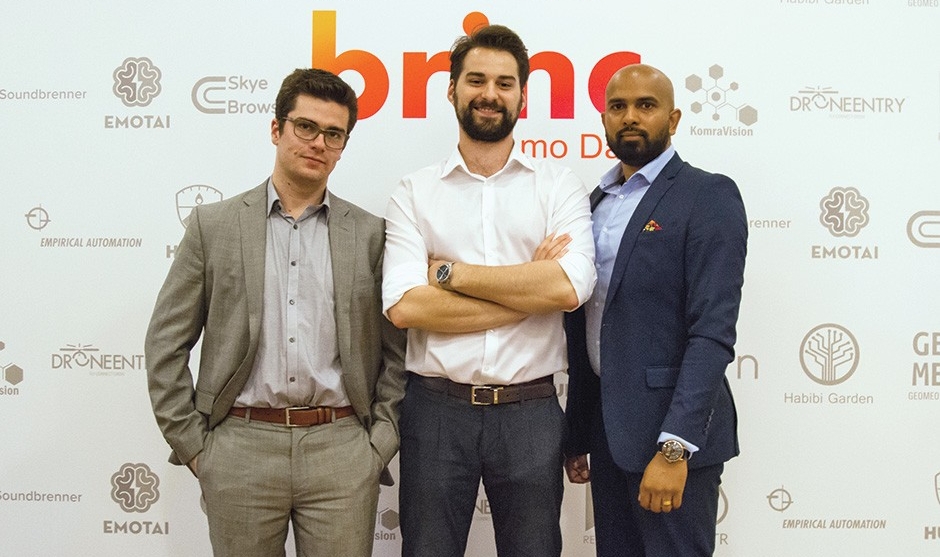Heads-up! Concordia grads driving innovation
In Good Company is a series on inspiring grads who work for corporations and non-profits that hire a large number of Concordia alumni. To be featured, please contact us at alumni@concordia.ca or @ConcordiaAlumni on social media.

A startup by Concordia grads wants to use heads-up display (HUD) technology to improve the efficiency, safety and bottom lines of commercial vehicle fleets.
With plans to launch this winter, their startup, Aura Innovation, uses “augmented reality and the Internet of Things to create a fleet-management service,” explains cofounder and chief technology officer Tristan Cool, BEng (electrical engineering) 17, who started the company with chief executive officer Gabriel Hercule, (attendee). “We offer clients a dashboard-mounted, heads-up display device that projects a hologram onto the windshield displaying route information, speed, lane guidance, braking gauge and a number of features related to driving information.”
While HUD technology can be found in luxury consumer vehicles, says Cool, a 26-year-old Montrealer, Aura’s product is “not just an interface, but a working tool.” By targeting commercial vehicles as their client base – think delivery vans, semi trucks, taxi drivers, emergency vehicles. “We can help them reduce fuel costs, reduce insurance premiums, train drivers more quickly, track them and send information directly to the windshield.”
Hercule, 26, explains that “the business premise is that we have features we integrate already and the service we offer is to create custom HUD features, anything our client desires.”
The duo started developing the concept in 2016 during pizza-fueled work sessions at the Electronics lab of Concordia's student branch of the Institute of Electrical and Electronics Engineers. “The prototype was very much developed late at night,” Cool says.
“We both had jobs, bootstrapping the startup on the side, any time we had was devoured by this idea.”
Hercule, who grew up in Markham, Ont., says he has always had an entrepreneurial bent. As for Cool, he’s into cars and entered the aerospace industry with a CAE internship in 2014, followed by an avionics engineering specialist job at TRU Simulation + Training, thanks to Concordia’s Co-op program.
They met when Hercule marched into the IEEE Concordia lab looking for the right collaborators to get a startup off the ground. “There was one guy in the room, typing at the computer wearing slippers,” Hercule recalls. “He was like, ‘What do you want?’ ”
Shortly thereafter, they officially partnered up to apply for a startup program at Concordia’s District 3 Innovation Center. They got into the program, where, Cool says, “they give mentorship, help you pitch, speak to investors, approach clients.”
It was there they first met Sujan Soosaithas, BEng (mech.eng.) 09, MEng 18, their assigned mentor, who would later come aboard as the company’s third cofounder and chief operating officer (with a focus on mechanical design, manufacturing and supply chain).
“We’re using an innovative approach for a product that’s really disrupting different aspects of the automotive industry,” says Soosaithas. “We’re thinking about what the future looks like, [about] augmented reality, human-machine interaction. We’re pushing those boundaries and I find that really fulfilling.”
Things really got rolling in late 2017, when they were accepted into London, England’s Startupbootcamp IoT accelerator program (as HUDlog, their company’s original name). Theirs was one of nine projects chosen out of 350 for 2017’s IoT accelerator program. The trio went to London.
“They invested in us,” Cool says. “We got really chummy with the London scene, spoke to customers, developed the product and built the team.” (Which now, they say, includes two interns and several contractors, plus the co-founders.)
Then came a second round of pre-seed funding as part of Brinc’s Connected Hardware accelerator program in Hong Kong, where they were accepted into its spring 2018 program. The trio spent the summer of 2018 there and visited factories.
Now, Cool says, they’re in the process of “de-bugging, doing sales, developing partnerships and getting ready for launch.” Hercule says that now, before seeking to raise seed funding, data is another focus. “We want more data than we know what to do with, and tweaking, tweaking, tweaking, until we get it just right.”
Aura Innovation's product (for which they hold three pending patents for hardware, interface and application) “could not be more of a Concordia invention,” says Cool, who keeps in touch with former professors in the Department of Computer and Electrical Engineering.
“I encourage Concordia developers, engineers and business students to take the leap while they're young; it’s really not that scary,” says Cool. “If you have to change cities, get international as soon as possible, build the right team and have faith in your idea. You’ll get ‘no’ 10 times more than ‘yes,’ but the yes is always a big win.”
Soosaithas also values his Concordia ties. “What made the difference for me was the Concordia Institute of Aerospace Design & Innovation (CIADI),” says Soosaithas, who was accepted into its internship program back when he was a student. This, he adds, helped him land a variety of internships “doing all these different things,” which he feels made his CV stand out to Concordia’s District 3 as a possible mentor.
“The difference is seen here; that’s what attracted [Hercule and Cool] to considering me as a mentor. I’m part of this project because they considered me good enough to be a mentor, which opened the door to be a co-founder.”
As for Hercule, he very much connects to Concordia’s entrepreneurial spirit. “For me, it was all about building a business from day one,” he says. “I dedicated a lot of time at Concordia at District 3. I would just go there and write ideas. And today, most of my friends and the people I go to for business advice are Concordia-based.”


